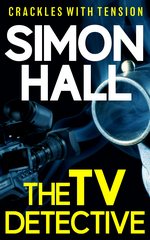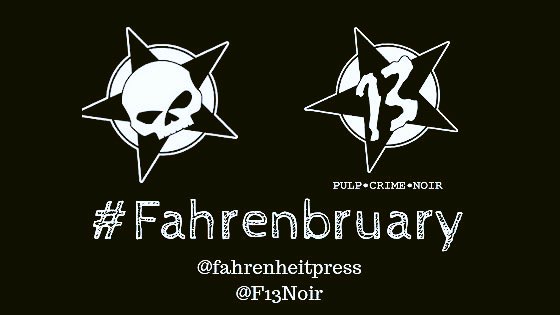Meet Dan Groves, a good reporter with a good dog. Which is enough reason to read the book, but there are others, too, as I was happy to discover.
 The TV Detective
The TV Detective
by Simon Hall
Series: The TV Detective, #1
Kindle Edition, 290 pg.
Fahrenheit Press, 2018
Read: May 16 – 17, 2018

The first interview with a witness.
Or, as Breen had put it, ‘Initially a witness, anyway.’
‘Meaning?’ Dan asked, as they walked down the stairs from the MIR.
‘It’s remarkable how quickly a witness can become a suspect in this business.’
All it needed was a musical sting to emphasise the drama of the detective’s words. Dan was beginning to suspect his new colleague was a frustrated actor. He certainly enjoyed a little theatre.
Dan deposited the thought safely in his mental bank. It might just be useful.
Carter Ross, I. M. Fletcher, Annie Seymour, and Jack McEvoy are my favorite reporters who happen to find themselves in the middle of criminal investigations (“find themselves” is typically code for throw themselves into, slip past the all the blockades surrounding, etc.) — I think Dan Groves has added himself to the list. But I’m getting ahead of myself.
Dan Groves is a TV Reporter for Wessex Tonight, covering environmental news. With the Christmas holiday rapidly approaching, he’s forced to help cover the latest in a string of attacks on prostitutes. He and his cameraman/friend Nigel are found taking a less-than by-the-book approach to getting a colleague of the latest victim on camera (really, Nigel didn’t do anything — but he didn’t stop Dan, either). The story they aired was good, but their tactics were reported — between his editor’s need, his skill, and his editor’s fresh material for leverage — Dan’s taken off the Environment beat and made the program’s new crime reporter.
The problem is, he knows nothing about reporting on Crimes. And demonstrates it with a facepalm-worthy performance at his first crime scene (a murder, of course) after getting this assignment. So he pitches this idea to his editor, who in turn runs it by the local police. The police haven’t been looking good to the (and in the) press lately, Dan needs a crash course in detective work — so why doesn’t he shadow the investigation, giving the police some good coverage and PR while he learns on the job from the best around. DCI Breen — and (the underused) DS Suzanne Stewart — aren’t crazy about this idea, but they aren’t really in a position to argue with the brass, so they bring him on. Tolerating his presence largely at the beginning, but gradually finding ways to use him.
This is one of those cases that the police would probably be okay with not solving — at least most of the police. Edward Bray was in Real Estate — he owned many buildings, treated his tenants horribly and evicted them when he could find a way to make more money off of the land/building. He was heartless, notorious, and had an enemies list worthy of a, well, an unscrupulous land-owner. Yet, he also gave generously to a local hospice — so generously that many people had a reflexive notion to commend him while they suffered cognitive dissonance between his perceived nature as a shark, and his obvious and selfless good work with the hospice center. The list of suspects is long — former tenants, an employee, competitors he profited from and ruined, his own father — and the head of the hospice center who chafed under his authoritative hand.
So there’s the setup — a pretty good hook, I have to say. It’s an interesting pairing — Castle-ish, but not as goofy. I could totally buy this without suspending a whole lot of disbelief. The reactions of the other police officers help ground this. So who are the investigators?
First is Dan Groves — he seems to be a decent reporter, we’re told repeatedly that he has a history of looking out for the little guy in his news stories. He’s into the outdoors, hiking and whatnot. He’s very single and has been for some time — there’s a hint of something significant in his past that put him there, but we don’t get into that in this book. I’ve never read about a reporter not wanting the crime beat — it’s the most interesting, right? I just didn’t get his rationale for quite a while. But by the time we’ve heard about a few of his past stories, I guess I could see it (and have to admit that Environmental News sounds pretty dull, but wouldn’t have to be in the right hands). Lastly, Dan has a German Shepherd named Rutherford, who seems like a great dog. This speaks volumes for him.
DCI Adam Breen is your typical driven detective — stern, unbending (at first, anyway), not that crazy about the unusual staffing on his inquiry. He has a flair for the dramatic (as noted above — but it’s worse), seems to spend more time and money on clothing than most (somewhere, Jerry Edgar is fist pumping the idea that he’s not alone). We eventually get to know a little about him outside the job — and it seems to go well with the character we’ve met. He seems like the kind of detective most police departments could use more of. Breen will warm to Groves (and vice versa) and will find ways to use his strengths, as Groves finds ways to flex them.
DS Suzanne Stewart, on the other hand, is little more than a name and a presence. Hall needs to find a way to use her character in the future or drop her. This character is the biggest problem with the book. Not an insurmountable one, or one that greatly detracts from the book, but still. I get that Hall’s priority was establishing the relationship between Groves and Breen — and he nailed that. But he could’ve given us more of Stewart along the way. We could also use a little more development with Nigel and Dan’s editor, Lizzie — but I honestly didn’t notice how underused they were. Stewart stuck out to me.
Hall does a really good job of balancing the murder inquiry and dealing with the characters outside of the case — Breen off-duty, Dan’s blossoming personal life, another story or two that Dan works on. The suspects are well-developed and interesting — and there are times that you could totally buy all of them (well, maybe all but one) as the actual perpetrator. That’s really hard to pull off, many writers will start off with a long list of suspects and really only have one or two that you can believe being the killer after one conversation. They all have similar but individualized reasons to want Bray dead. Most of them also have strong alibis, because you don’t want this to be easy. The solution to the case is clever — and better yet, the way that Groves and Breen have to work together to get the solution proven is well executed.
Hall’s writing is confident and well-paced. He knows how to use characters and plot to strengthen each other. There are occasional turns of phrase that will really make the day of readers. I have a lot of “oh, that’s nice” notes throughout the book. This is a solid start to a series — the kind that makes me want to read more. I’m looking forward to finding out a little more about Dan’s history as well as seeing the relationship between he and DCI Breen grow and change (and be challenged, I assume). Good stuff.
—–




Read Irresponsibly, but please Comment Responsibly